views

How the LA unrest impacted some in the community
The Rodney King verdict and the subsequent LA riots, which occurred 30 years ago, left a lasting impact on the lives of many individuals who grew up in the aftermath, forever altering their perception of their home and community, while others saw the riots as a moment in history that ended when the smoke cleared; this story offers a unique perspective by remembering the events of 1992 through the eyes of those who were children and teenagers at the time.
Paulette Washington

Jaylah Washington, a 16-year-old resident of South Los Angeles, attends to her mother Paulette Washington's injured finger with bandages in the comfort of their own home on April 22.
Driving down Normandie Avenue, a few blocks north of Florence Avenue, where the 1992 LA riots centered following the acquittal of the officers who beat Rodney King, Paulette Washington recalls her childhood memories of the place she called home, with her father as a pastor at a nearby church and the local Tom's Liquor where she used to shop, and even after her family moved to Inglewood in 1989, she would still sneak back to the neighborhood.
On the day of the verdict, April 29, 1992, Paulette Washington and her sister were glued to the TV at a friend's house in their old neighborhood, but when the news came that none of the officers had been convicted, Washington was left in utter disbelief.
FIRST PICTURE

END PICTURE

FIRST PICTURE: The intersection of Florence and Normandie during the the unrest known as the LA riots on April 29, 1992. | END PICTURE: The intersection in 2022. Can you change this text to be a little longer in one line?
At that point, it was kind of scary,” she said. “Where’s this going to go?
As she witnessed some of the people gathering at the intersection, Washington observed the chaotic scenes of cars being stopped, including the truck driven by Reginald Denny, whose brutal assault was later captured in helicopter footage. Among the individuals involved in the attack was Damian "Football" Williams, someone Washington grew up with and who was seen in the video hitting Denny with a cinder block.
The chaos and unrest on the streets of South Los Angeles on the night of April 29, 1992, compelled Washington to head back to her old neighborhood, even though she had gone home to Inglewood earlier with her sister; after arriving at her home, she realized she had to return to the neighborhood, where her friends were still there and in need of her support, so she and her mother went back up Normandie Avenue that evening to search for them.
As they arrived at the intersection of Florence and Normandie several hours later, the darkness and smoke that filled the streets from the burning fires created a scene of devastation and chaos, with people watching from their balconies. Washington was deeply affected by the sight of her neighborhood in such a state, and despite searching for her friends, she was unable to find them in the midst of the chaos and destruction.
"As Washington looked out into the dark and smoke-filled streets, she couldn't help but feel the weight of the sadness and frustration that was palpable in the air, as many families were torn apart due to the arrests of parents, leaving kids without any caretakers, while the whole community was witnessing the destruction of their own neighborhood, all due to the fact that justice wasn't served, and the verdict had further deepened the already existing racial tensions and systemic injustices that had been plaguing the country for decades."

Paulette Washington celebrated her birthday with her son, Jordan Nixon, who is now 17, after attending a class on gang and violence prevention at Chuco's Justice Center in Los Angeles on February 24, where Nixon sang a special song to his mother, marking a moment of hope and healing in the wake of the traumatic events their community experienced during the LA riots.
Paulette Washington celebrated her birthday with her son, Jordan Nixon, who is now 17, after attending a class on gang and violence prevention at Chuco's Justice Center in Los Angeles on February 24, where Nixon sang a special song to his mother, marking a moment of hope and healing in the wake of the traumatic events their community experienced during the LA riots.
"Paulette Washington has a vision to create a positive impact on her community by bringing forth a better generation of people, and to achieve this goal, she has been working tirelessly with various organizations that aim to prevent gang violence, intervene in criminal behavior, empower women, and provide school supplies and food to those in need; her ultimate dream is to establish a center that can equip young people with vocational skills and empower them to build a better future for themselves and their communities."
Gernay Quinnie

Gernay Quinnie, who was born and raised in South Los Angeles, has been working with the Big Dogg Gang and Violence Prevention class at Chuco’s Justice Center to help prevent violence and gang activity in the neighborhood.
Gernay Quinnie, now 40, vividly recalls the day of April 29, 1992, when the rest of the world was on the edge of their seats, awaiting the verdict of the Rodney King trial, he was simply watching cartoons with his brother, as he was only 10 years old at the time.
Quinnie recalls feeling scared and abandoned when his mother was arrested during the riots, leaving him and his brother alone for several days, but they were able to survive thanks to free food vouchers delivered by a local grocery store chain, which they used to get sausages and bread.
After days of civil unrest, during which Quinnie and his brother were left to fend for themselves while their mother was arrested, the boys emerged from their home in the West Athens neighborhood of Los Angeles to a new reality characterized by burnt-out buildings, empty lots, and an overall sense of destruction and loss, which left a lasting impact on Quinnie's community and his life.
"Reflecting on the aftermath of the events in 1992, Quinnie shared that it not only impacted his community but also affected him personally, as it led to a sense of low self-esteem and a devaluation of his own life, which in turn, fueled his desire to turn to gang life."

Gernay Quinnie, who was deeply affected by the events of 1992, now works at Chuco’s Justice Center in Los Angeles, which used to be a juvenile courtroom and jail, and is dedicated to providing education, mentorship, and support to young people in the community who are at risk of becoming involved in the criminal justice system.

Gernay Quinnie, who grew up in the aftermath of the 1992 LA riots, now runs his class on gang intervention and prevention at Chuco's Justice Center in Los Angeles, which used to be a juvenile courtroom and jail.
After serving 18 years in prison for multiple counts of robbery, Gernay Quinnie believes that his time in prison helped him confront and overcome the low self-esteem and insecurity that led him to find a sense of belonging in the gang life.
Quinnie believes that the events of 1992 were a turning point in his life and led him down a dark path, but through his time in prison, he was able to confront and address his personal struggles, and now he sees his community in a new light, as a place with the potential for hope, love, and peace.
Gernay Quinnie, who was released from prison in 2019 after serving 18 years for multiple counts of robbery, now dedicates his time to working with other formerly incarcerated individuals and in youth gang intervention and prevention through the Big Dogg program at Chuco’s Juvenile Center, a former juvenile court and jail that still has cells used as storage rooms, where programs like the one Quinnie and Kimi Lent run are making a positive impact on the South Los Angeles community by helping youth stay clear of gang life.


Robert Ahn

Robert Ahn, a Korean American attorney and former candidate for Congress, stands at the intersection of South Western Avenue and West 6th Street in Los Angeles, a bustling and diverse neighborhood where he has long been involved in community activism and advocacy.
Robert Ahn has a deep connection to Koreatown, as it was the center of his family's activities, with his father's real estate business and retail building located on West 6th Street and South Western Avenue, and even though they moved around the LA area, they always found their way back to K-Town for shopping, church, and family dinners.
As a child, Robert Ahn's father's office on West 6th Street and South Western Avenue in Koreatown was more than just a place of business; it was a refuge where Ahn spent time studying and playing with his sister and a makeshift daycare when their parents were unavailable to care for them.
As the verdict for the Rodney King trial was announced on April 29, 1992, Robert Ahn and his family watched it on TV and witnessed the chaos and destruction that followed in other areas of Los Angeles, including attacks on some Korean-owned businesses, but thankfully Koreatown was mostly spared on the first night of unrest; the following day, Ahn's family learned that the stores in their community were in danger, and his father, who owned a building there, took action to protect it.
FIRST PICTURE

END PICTURE

FIRST PICTURE: Western Ave and 5th St in Koreatown, Los Angeles, in 2022 | END PICTURE: Korean storeowners defend their property as gunfire breaks out in Koreatown at Western Avenue and 5th Street on April 30, 1992.
"Robert Ahn remembered a sense of foreboding before the 1992 unrest in LA, as law enforcement presence dwindled and community members started to arm themselves to protect their businesses and livelihoods; despite Koreatown being largely spared on the first night, Ahn and his family were prepared for the worst."
As his father and other men in the community guarded their businesses against potential harm during the unrest, Ahn explained that they utilized their military training from Korea and small arms to protect their livelihoods, while others used rice bags and cars to create perimeters around their stores or stood on rooftops along Western Avenue; however, Ahn's father did not permit him to join them.
Ahn's frustration and anger intensified as he watched the destruction of his community with no aid from the city, leaving him feeling abandoned and questioning the whereabouts of the police and National Guard, while wondering who would come to the aid of his community during the unrest.
Robert Ahn recalled feeling a complex mix of emotions during the unrest, including sadness and fear, but also a growing anger and resentment towards the lack of aid from the city, the absence of law enforcement, and the seemingly misplaced deployment of National Guard troops to other areas of the city.
"Reflecting on the lack of aid during the 1992 unrest, Ahn concluded that the Korean American community at that time didn't have political power or a voice, which made them expendable, and resources were directed towards other communities that had more political power, leading to feelings of sadness, fear, and anger."

The orange and pink hues of the setting sun cast a warm glow over the bustling streets of Koreatown, a vibrant neighborhood in the heart of Los Angeles known for its diverse community, bustling nightlife, and delicious cuisine.
Motivated by the lack of representation and political power he saw in the aftermath of the 1992 unrest, Ahn pursued a career as an attorney and served on various commissions and boards in Los Angeles, including the City Planning Commission, the Redistricting Commission, and the Korean American Coalition, working towards building bridges between the Black and Korean communities. In 2017, Ahn ran for Congress, but was ultimately defeated in the election.
Robert Ahn has witnessed significant transformations in Koreatown since the unrest of 1992, as it has evolved into a vital economic hub that drives the economy of the city of Los Angeles.
Reflecting on the progress made since the 1992 civil unrest, Ahn finds it impressive to witness the transformation of Koreatown into a thriving economic hub, despite the destruction and trauma that occurred.
Aurea Montes-Rodriguez

On March 2, Aurea Montes-Rodriguez, executive vice president at Community Coalition, was photographed near the intersection of South Vermont Avenue and Manchester Avenue, a location in South Los Angeles where she has been actively advocating for community empowerment and social justice initiatives for decades.
Aurea Montes-Rodriguez, executive vice president at Community Coalition, vividly recalls the pivotal moment in her life when she was just 16 years old, and had to walk 3 miles home from school amidst the chaos and destruction of the 1992 LA riots, witnessing burnt-out businesses, armed men guarding surviving structures, and a sense of desertion and neglect from the city.
"As she walked home after witnessing the aftermath of the violence, including burned-down businesses and men protecting the structures that were still standing, Montes-Rodriguez couldn't help but feel abandoned and left to figure out how to move forward with other kids her age."


Years later, after that impactful walk, Montes-Rodriguez was inspired to start her journey in community organization, driven by the desire to ensure that the unrest of 1992 wouldn't be the lasting memory of South Central and to work towards building a better future for her community.
Despite the challenges she faced as an undocumented girl from Mexico, South Central became the home that embraced Aurea Montes-Rodriguez, and today, as the executive vice president of Community Coalition, she is committed to serving the community by assisting its members in organizing and advocating for equitable access to resources.
Located just three blocks away from the Community Coalition office, the empty lot has remained undeveloped for almost 30 years, despite President Bill Clinton's promise to rebuild it after the 1992 riots; however, in 2020, development began to transform the lot into a public boarding school, an affordable housing complex, and a Metro training center.
Margarita Carias Valencia and Elmer Roldan

Margarita Carias Valencia, a survivor of the 1992 LA riots, stands with her son Elmer Roldan outside their family home in South Los Angeles on the 29th anniversary of the unrest, reflecting on the trauma and loss that they experienced and the progress that has been made in their community since then.
Margarita Carias Valencia, who refers to the LA unrest as the nightmare of 1992, moved to South Los Angeles on her own in 1986 to seek better opportunities for her family in Guatemala, and after a few years of hard work, she managed to save enough money to bring the rest of her family to the US and start building a new life.
In 1989, Margarita Carias Valencia brought her family to the US and settled in a one-bedroom apartment near the Leimert Park neighborhood, which was composed of Black and Latino families, where her youngest son, Elmer Roldan, was 9 years old and began adapting to life there, watching shows like Martin on the television set that sat in the hallway of the family’s home.

In Margarita Carias Valencia's South Los Angeles home on April 8, a photo of her family hangs in her bedroom, serving as a reminder of the sacrifices she made when she moved to the US from Guatemala in 1986 to seek better opportunities and later brought her family to live with her in a one-bedroom apartment near the Leimert Park neighborhood, where they adapted to a community of Black and Latino families.
Reflecting on her family's early years in the US, Margarita Carias Valencia recalls how despite facing financial hardships and having limited resources, having her loved ones close by and even just sharing a simple meal like caldo de pollo brought her a sense of comfort and security.
On April 29, 1992, Margarita Carias Valencia was accompanying a friend to drop off some invitations when they started to see people take to the streets and some small garbage-bin fires along the way, and they decided to drive back, but they were unaware of what was unfolding or where, and as a result, they drove right through the intersection of Florence and Normandie, which was ground zero for the unrest.
On that fateful day, the violence erupted so suddenly that Margarita Carias Valencia and her friend found themselves in the middle of it, driving through the intersection of Florence and Normandie, where a nearly full 40-ounce beer bottle was hurled at their car, shattering the window with such force that it exited through another window, and people approached the car and began to move it, while they were stunned, and as things started to escalate, her friend sped up, and they drove past a beaten Reginald Denny on the street.
At home and unaware of the chaos unfolding outside, Elmer Roldan, who was 13 years old at the time, sat watching television when his mother burst into the room with her head covered, frantically picking pieces of broken glass from her hair after narrowly escaping injury from a beer bottle that shattered the passenger window of their car during the riots.

Margarita Carias Valencia, who narrowly escaped injury from a nearly full 40-ounce beer bottle that broke through her car window during the 1992 unrest, demonstrated how she cleaned broken glass from her hair on April 29 of that year, when riots erupted across Los Angeles after the acquittal of police officers who were caught on camera beating Rodney King.
After days of isolation, the family made a risky journey to buy groceries on the West Side, where the National Guard was stationed, because stores in their neighborhood had been emptied and their food had gone bad due to a power cut; sadly, many of the stores that were looted or destroyed during the unrest were never rebuilt.
Years later, reflecting on the aftermath of the unrest, Roldan realized that the lack of resources and opportunities in South LA were some of the underlying issues that contributed to the community's frustration and anger, leading to the riots; he believes that investing in the area's economy and social infrastructure is key to prevent such events from happening again.
"Reflecting on the aftermath of the LA unrest, Elmer Roldan noted that it was a turning point for many Latinos, who came to the US seeking a better life and believed in the American promise and the rule of law, but were left to fend for themselves, which had a significant impact on their psyche."

Elmer Roldan stands in the same living room of his childhood home in South Los Angeles where he watched the news coverage of the 1992 riots and wondered why no one came to help his community, and now, as an adult, he continues to work towards bringing resources and support to underserved communities in the area.
"Elmer Roldan recalls how the response to the unrest made it clear that authorities were not there to protect the predominantly Black and Latino communities in South Los Angeles, as many felt that they were left to fend for themselves while the police prioritized protecting the wealthier and whiter areas of the city."
Elmer Roldan, who experienced the 1992 LA riots as a child, now serves as the executive director of Communities In Schools of Los Angeles (CISLA), a nonprofit that provides support to students in need in partnership with local schools, and despite having the option to leave South LA after the unrest along with many other families, Roldan's mother chose to stay in the area, a decision that ultimately influenced his own commitment to working for the betterment of the community.
Margarita Carias Valencia fell in love with South Los Angeles despite the unrest feeling like a war zone, and despite having the opportunity to move to the Valley like many others did, she chose to stay because she loves living there and does not like the hot weather of the Valley.











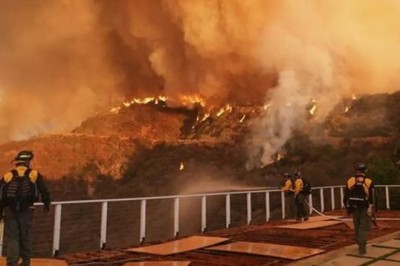
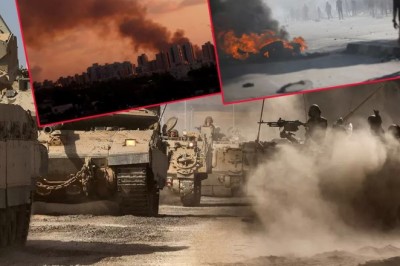
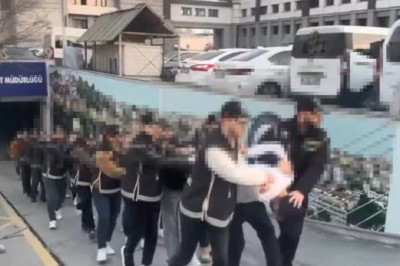

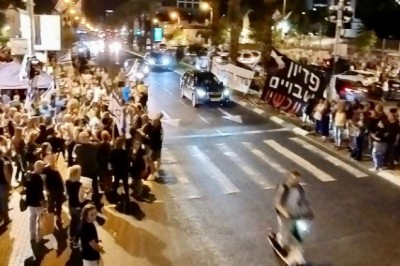
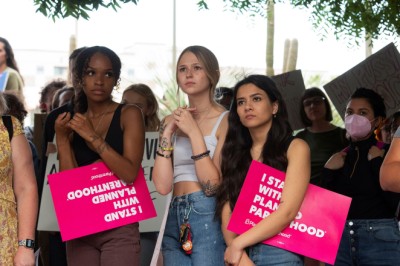


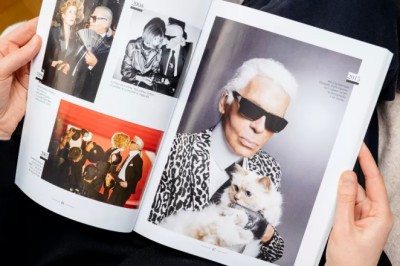
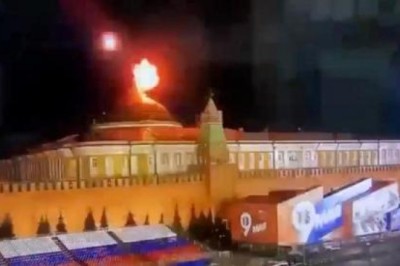
Comments
0 comment